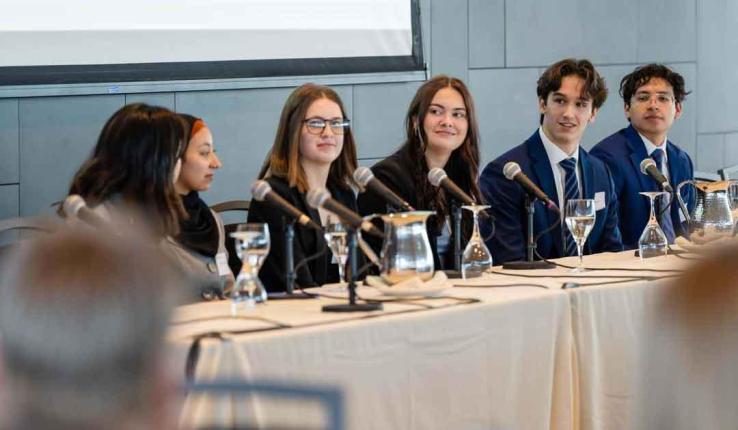In choosing the HEDS survey, Vice President for Equity and Community Donald Outing noted the Consortium’s particular experience in assessing diversity and equity at institutions of higher education.
“What was missing from many other surveys we considered was expertise in assessing a student body,” he explained. “HEDS looks at faculty and staff as the workforce of the organization, but then also captures the undergraduate and graduate student experience.”
The first year of the survey will offer the university benchmarks from which to measure future results. Because numerous private colleges and universities administer the HEDS Diversity and Equity Climate Survey to their campus communities, Lehigh will be able to take advantage of comparative analytics.
Outing says conducting a climate survey is essential to understanding how the university is progressing in its effort to foster an inclusive and equitable campus.
“In my mind, I think we’re doing well, but I have a close-up view,” he said. “I see the forward movement that we're making but perhaps not everybody sees that.”
Progress Since Prior Climate Survey
Lehigh’s most recent climate survey, conducted annually from 2015 through 2017, was developed by faculty members at the university. Members of the Lehigh community, including the Council for Equity and Community, reviewed the quantitative and qualitative data. They then produced sets of recommendations each year.
Among the recommendations implemented as a result of the survey are:
- Creating the position of Vice Provost for Equity and Community
- Increasing the diversity of the student body
- Providing learning opportunities for staff and faculty.
Outing has served as the inaugural Vice President for Equity and Community since 2017.
“We've moved at a pretty good clip from where we started, developing the Office for Diversity Inclusion and Equity and re-aligning the advocacy centers within it to advance broader community interests,” Outing said. “We then established a position focused on student access and success to support and provide opportunities for students not just to attend Lehigh, but to participate in the high impact experiential learning opportunities that exist here.”
These and other efforts have resulted in an increase in the number of first generation and underrepresented students studying abroad, getting involved in undergraduate research, and obtaining internships. Outing added that the undergraduate student senate also now better represents the broad diversity of perspectives, backgrounds and experiences of Lehigh’s student body.
To address concerns identified by staff and faculty, the Office of Diversity, Equity and Community partnered with Lehigh Human Resources to develop the Cornerstones of Community program. This career enrichment track includes workshops and other offerings designed to educate employees about implicit bias, stereotyping, bystander intervention, and effective communication across differences.
Student Participation Crucial to Success
Outing says that the data gathered from the survey will inform the work of not only his office, but the entire university. While staff and faculty responses are important, he says participation by students of every background and perspective is especially critical to the survey’s success.
“If students will share their real, lived experience with an administration that doesn’t get to see what goes on with the student body on a day-to-day basis, we will be able to direct resources in the right way. Without that, we will have to act on our perceptions,” he said.
Story by Hillary Kwiatek
__________________________________________________
Facts About The HEDS Diversity and Equity Climate Survey
When will the survey take place?
The survey will open for Lehigh faculty, staff and students to complete from 1 p.m. EDT on Monday, April 13, 2020. The survey will close at 11:59 p.m. EDT Sunday, May 10, 2020.
Who should complete the survey?
The survey has been used by public and private institutions, from community colleges to research universities, and is designed to be administered to everyone in the campus community – undergraduate students, graduate/advanced degree students, faculty, staff, and administrators.
How will I receive the survey?
All staff, faculty and students will receive an email invitation from HEDS with a unique link to the survey. This link is for the recipient only and should not be shared.
What happens If I accidentally delete the email with my link to the survey?
Additional reminder emails containing the link will be sent to you during the survey period.
How long will it take to complete the survey?
HEDS estimates that the survey should take about 15 minutes to complete.
Will my answers be anonymous?
Although the survey will include questions about your identity, your responses are anonymous. HEDS is an independent organization and they will remove any personally identifying information from survey data before sharing it with Lehigh. You can read more about the steps HEDS takes to ensure your anonymity here.
Is participation mandatory?
Participation in the HEDS Climate Survey is voluntary. However, the higher the level of participation in the survey, the more meaningful and accurate the data will be.
As a token of appreciation for your time, you may be randomly-selected for one of the following thank-you gifts: one $100 gift card to Amazon, two $50 gift cards to Amazon, and 10 $20 gift cards to Amazon.
How can my responses remain anonymous if I am entered in the random drawing for the thank-you gift cards?
The drawing for the thank-you gifts does require identifying information so that we can distribute the gift cards to those who are randomly selected. However, the optional drawing registration is collected completely separate from the actual survey, via an extra elective step described at the end of the survey. By choosing to register for the drawing, you would convey that you participated in the climate survey but your actual responses to the survey cannot be linked to your identity.





